In a tiny alley just a block away from Ikseon-dong, in the center of old Seoul, an unexpected haven of Greek culture beckons. Niko Kitchen, occupying a hanok, or traditional Korean house, showcases its devotion to true Greek cuisine, building a loyal clientele.
The owner and chef, Nikolaos Kordonias, better known simply as “Niko,” grew up on Samothrace, an island in the Aegean Sea that is home to the mythical Sanctuary of the Great Gods, including Nike, the winged goddess of victory.
Niko’s deion of his ancient birthplace is idyllic. It conjures familiar images of a Greek island filled with whitewashed villas: “Beautiful, quiet, nice people. The pace of life is slow.The people are laid back, easygoing. They don’t worry. They have their houses, their work. They don’t expect a lot from life. But they have their standards and they’re happy.”
And of course, there is “very good food.” The conversation lingers on organic produce, fresh chicken and tasty fish from the cobalt blue water around Samothrace. Growing up, the food that his mother and grandmother cooked captivatedhim. “It was the smells, I think,” Niko says.
All of that informs his life and work today. When he arrived in Korea in 2004, he immediately noticed the scent of different foods. Soon,aromas guided the direction of his casual walks. “The smell of food stalls, the cooking in the street. It was different. It was in the air – the chili, the kimchi,” he recalls.
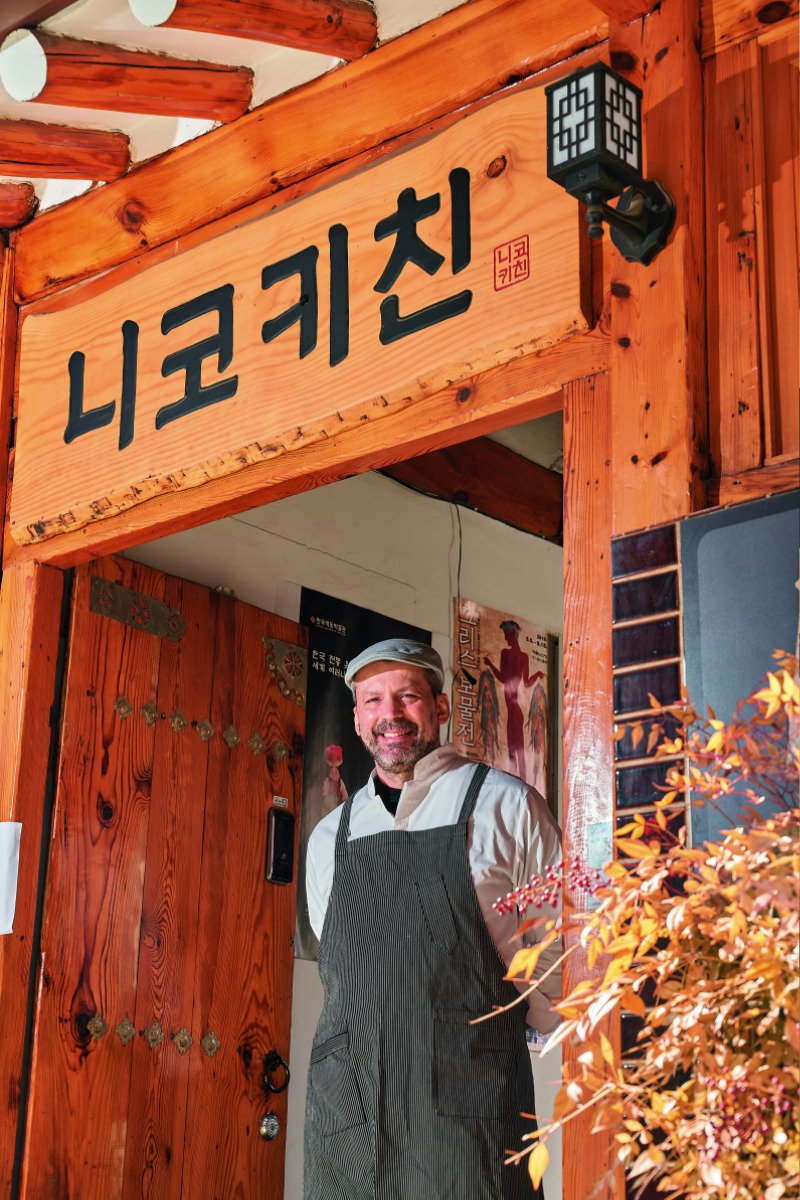
Every morning, owner-chef Nikolaos Kordonias personally opens the gate of his restaurant housed in a traditionalstyle Korean home near Changdeok Palace, Seoul. The nameplate sports a transliteration of Niko Kitchen.
Making Korea Home
Niko had accepted an offer to work at Santorini, the now-closed Greek restaurant in Itaewon, a vibrant Seoul neighborhood with international flavor. He had no prior inkling of what Korea might be like, no experience except for childhood taekwondo lessons. But coming here wasn’t a difficult decision; moving was natural to him. After working on cruise ships traveling around Mediterranean and Caribbean seaports, he studied at a culinary institute in New York andworked in Manhattan with leading chefs. Then he spent about six years in Canada, where an acquaintance owned several restaurants.
While cooking in Itaewon, Niko met Seo Hyeon-gyeong, who happened to be working in the same building as Santorini. They ran into each other coming and going and ended up getting married. Niko packed away any thoughts of returning to Greece and Seo shelved plans of leaving for Japan, where she had lived for manyyears. “Some things are just meant to happen,” Niko says of the way Seoul became his permanent home.
In 2018, Niko and his wife opened Niko Kitchen. He wasn’t looking for a hanok specifically, but its architectural style pleased him.When he took ownership, two stone statues of haechi, mythical fire-eating animals, came with the café that had previously occupied the building. They stand guard now in the exquisite little courtyard filled with potted flowering trees.Niko Kitchen is in an alley off a road once used by Joseon Dynasty soldiers when they patrolled around the royal ancestral shrine. Adjacent to the shrine is Changdeok Palace, a UNESCO World Heritage site. Close by is a historic Buddhist temple, and just a few strides along the alley is the Saekdong Museum, exhibiting traditional Korean fabric featuring colorful stripes. The restaurant is open every day, and Niko does all of the cooking. His wife calls him a workaholic, but Niko seems perfectly happy. “This is my life and I like it,” he says. “I like food. I like people to like the food and smile and come back.”
Between lunch and dinner, Niko allows himself a break; he strolls around Seoul, to palaces and temples, and to Cheonggyecheon, the restored stream flowing across the downtown area. Before the pandemic, he enjoyed relaxing at a sauna, but that’s on hold for now.
Being in a quiet spot away from the buzzing activity of Ikseon-dong, Niko Kitchen has few walk-in customers. Nevertheless, it’s always fullybooked. Korea’s insatiable appetite for cooking shows led to the restaurant, and Niko appeared as both a guest and a judge on several TV programs, such as Yeogi GO and O’live Show (on the cablechannel Olive). As media exposure swelled, would-be diners appeared early in the morning, and telephoned and emailed at all hours. Nikoacknowledges the benefits of the TV exposure, but for now, he wants to focus on his own kitchen.
The diners have a leisurely meal, sip wine and unwind. This is what Niko likes to see, the mood that he wants to create.
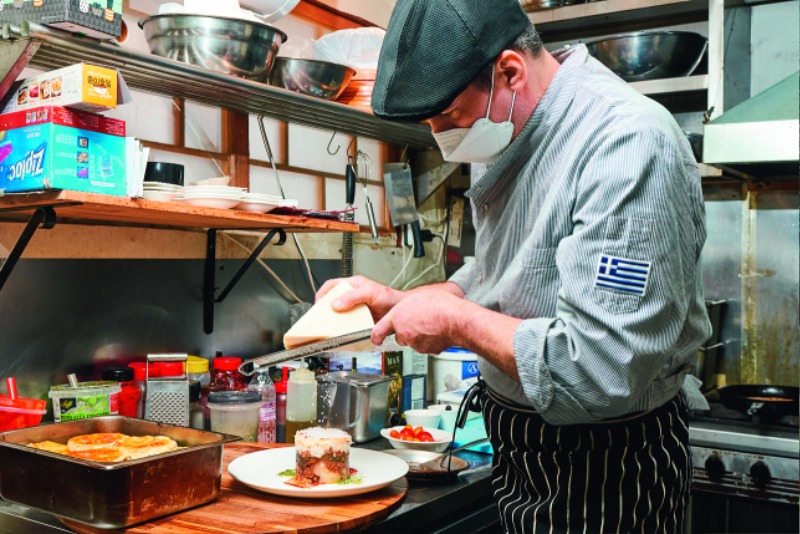
Niko does all of the cooking alone. His menu features Greek home cooking and dashes of Spanish and Italian dishes.
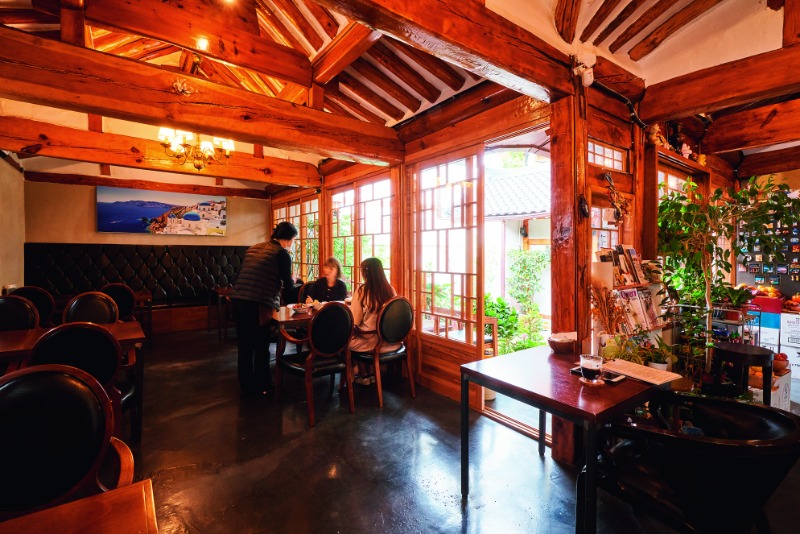
Niko Kitchen has only four or five tables, so reservations are recommended. Niko hopes to eventually have a bigger restaurant and serve Greek food exclusively.
Discovered by Foodies
The menu is based on Greek home cooking.Moussaka, a traditional dish made of eggplant and ground meat, is a perennial favorite withcustomers. Other popular dishes are Greek salad made with feta cheese, burrata salad, chicken souvlaki and shrimp saganaki.
Because Greek food can still be unfamiliar to many Koreans, the menu also includes pizzas andpastas, but made in Niko’s own style with handmade sourdough. He opted for fusion cuisine so that his hands wouldn’t be tied. He likes the freedom of ladling up Spanish or Italian dishes when he’s in the mood.
However, the keys to his food always remain the same: Mediterranean style, healthy and made with fresh, natural ingredients; mostly vegetarian, no sugar and minimum deep frying. In the early days, procuring Greek ingredients posed problems, but these days he can find everything he wants online. When a particular type of cheese or some other ingredient has to be obtained in a hurry, he stops by the shops in Itaewon, where he still lives today, on the way to work.
Like most restaurants, Niko Kitchen lost business to the COVID pandemic. But it has fully recovered now. Many customers are regulars, including staffers from the Greek Embassy and even the monks from the temple nearby, whose colorful façade featuring scenes from theBuddhist sutras can be seen over the top of the restaurant’s front gate. The diners have a leisurely meal, sip wine and unwind. This is what Nikolikes to see, the mood that he wants to create.
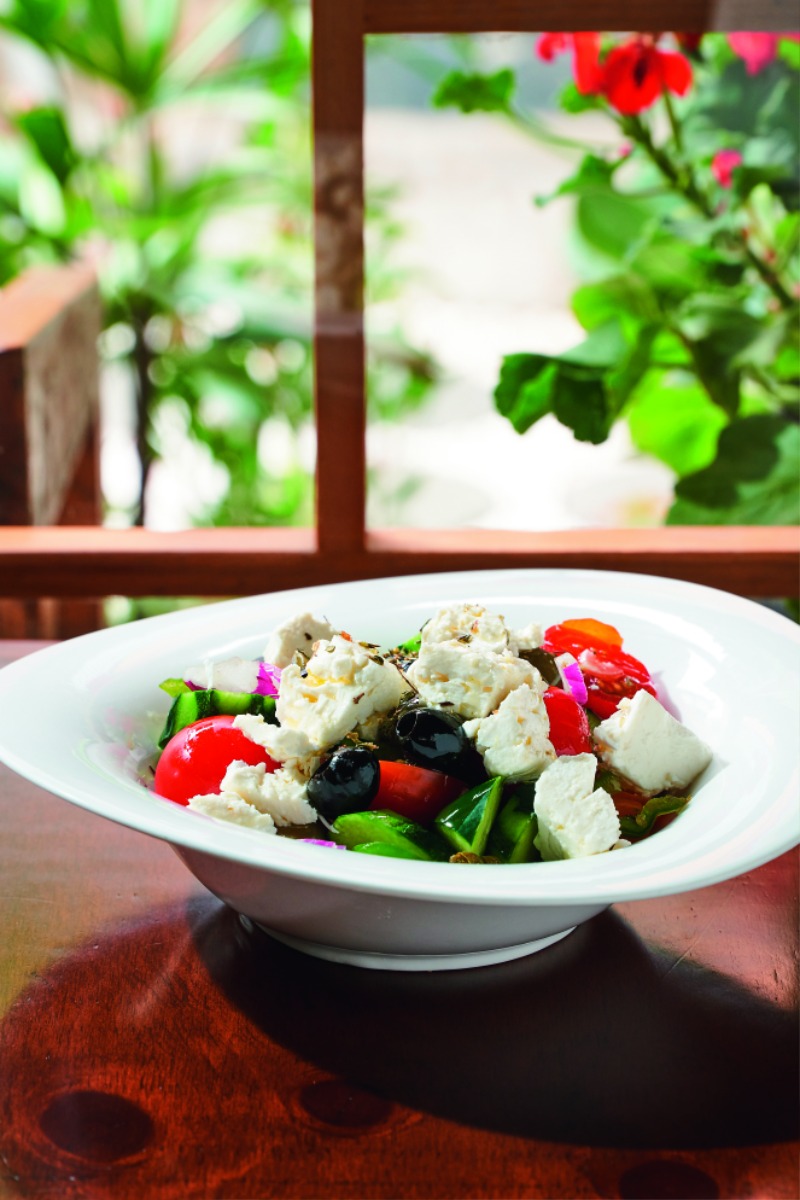
Greek salad made with fresh tomatoes, olives, cucumbers and onions, and topped with crumbly feta cheese is one of Niko Kitchen’s signature dishes.
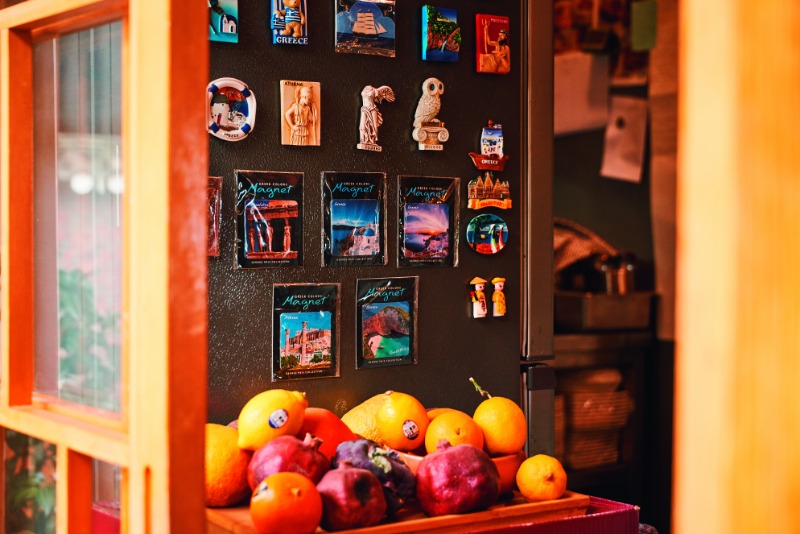
Reminders of Greece decorate Niko Kitchen.Magnets bearing photos of famous places in Greece cover one side of the refrigerator.
Days Ahead
When he muses about his adopted country, Niko mentions well-kept buildings and roads, an absence of public eyesores like graffiti, and theeducated and polite population. “This is like a paradise, the perfect place. That’s why I’m happy to be here,” he explains.Although he says he doesn’t really miss Greece, once the pandemic is over and the world
begins to heal, Niko would like to go back to Samothrace. He wants to relax a bit, see his family and friends, eat some good food and do somesea fishing. He’s also looking forward to the next step in his life, which is to open a bigger restaurant where the menu will be exclusively Greekdishes, not fusion. He’s been testing the waters and now has an idea of what people like and don’t like. Thus, he anticipates applying all his experience and knowledge in one place. “I want to make people happy – and make some money,too,” he says.
“Eat good food and you will feel good.” This is Niko’s simple philosophy. That said, his wife chips in with a revealing rejoinder: Niko likes hamburgers and occasionally indulges in Kentucky Fried Chicken. Food is what brought him to Korea, what keeps him here and what makes him happy. “At the end of the day, if people aren’t satisfied, then you’re tired. But if people are satisfied and smile, then all your problems and fatigue go away.”
Cho Yoon-jung Freelance Writer and Translator
Heo Dong-wukPhotographer